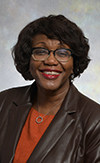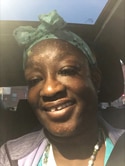HEALTH EQUITY HIGHLIGHTS
Meet the Leadership Team for the Black and African American Collective
 Dr. Allyson Brotherson, Executive Sponsor, is the Sr. Medical Director of Family & Community Medicine and has been with Hennepin Healthcare for 20 years. She divides her time between patient care and teaching. Dr. Brotherson is dedicated to addressing health disparities among minority populations.
Dr. Allyson Brotherson, Executive Sponsor, is the Sr. Medical Director of Family & Community Medicine and has been with Hennepin Healthcare for 20 years. She divides her time between patient care and teaching. Dr. Brotherson is dedicated to addressing health disparities among minority populations.

Demetris Lynch-Jones, Chair, is a Certified Medical Assistant in Internal Medicine and has been with Hennepin Healthcare for nine years. Demetris is looking forward to her leadership role and being able to understand and make a difference in our communities and our hospital setting.
Marnesha Hords, Chair, is the Welcome Services Manager and has been with Hennepin Healthcare for nine years. Marnesha is committed to creating an environment where all voices are heard and respected, and where we can be more open to seeing situations and people from perspectives other than our own.
Kim Marquardt, Chair, is the IT Finance and Vendor Management Manager in the IS&T department and has been with Hennepin Healthcare for four years. Kim is looking forward to contributing to the development of programs that will break barriers and eliminate stereotypes and stigmas within our community. Her hope is that this will lead to positive changes in social justice for this generation and generations to come.
The Collectives are designed for Hennepin Healthcare employees to foster:
- affirming social relationships
- professional networks
- development opportunities and
- a deeper sense of belonging by creating a space where diverse employees can be their authentic selves and take a collective breath and pause.
The leaders of the Collectives serve as an advisory resource to contribute to more equitable and inclusive policies, practices and procedures that will:
- Support, develop and mentor Black, Indigenous, employees of Color and other marginalized and underrepresented communities.
- Attract, recruit and advance diverse talent of various backgrounds and identities that are currently underrepresented in leadership, clinical and administrative roles.
- Increase awareness of multicultural differences, understanding of cultural norms and celebrations of heritage.
- Partner with and increase opportunities to conduct business with local Black, Indigenous, Immigrant and POC owned businesses.
- Strengthen existing community partnerships and create new community partnerships.
- Provide a more equitable and culturally responsive care environment for patients.

